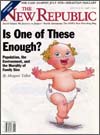
New York Times Magazine, July 12
(posted Thursday, July 9, 1998)
The cover story profiles Bernard Arnault, the French magnate in charge of Christian Dior, Givenchy, Luis Vuitton, and other fashion houses. French critics hate Arnault's "American" business style (profits over politesse) and disregard for fashion history (he puts brash young designers in charge of hallowed clothing lines). Arnault uses the media buzz of couture shows to sell his real moneymakers: perfume and cosmetics. ... A story profiles Betsey McCaughey Ross, the New York lieutenant governor under George Pataki, who is now running as a Democrat against Pataki. She's eccentric and demanding (she regularly fires staff), but she's expected to win the Democratic nomination. No one questions McCaughey Ross' intellect and wonkish understanding of policy. ... An essay claims that baby boomers are ushering in a new buzzword in the funeral industry: choice. Well-made caskets were once the standard of perfection. Now, boomers demand custom coffins, designer funerals, and crematory ashes FedExed to relatives across the globe.

Time and Newsweek, July 13
(posted Tuesday, July 7, 1998)
For the second time in four issues, Newsweek puts a Big Summer Movie on the cover--Steven Spielberg's Saving Private Ryan. While Vietnam has always received realistic treatment on film, World War II is only now being portrayed as complex, gory, and miserable. Spielberg's opening, a 30-minute depiction of D-Day, features exploding limbs, shocking head wounds, and bowels that "ooze" from a ripped-apart stomach.
Time's cover story claims we're fed up with HMOs (despite printing a Time/CNN poll showing that 88 percent of us find our current insurance coverage "good" or "very good"). HMOs' decision not to cover Viagra has alerted Americans to all the things their plans don't provide. The story urges us to "speak up, not just to the nurses and doctors but to our employers as well."
Newsweek says self-esteem therapy may be bad for teens. High self-esteem not justified by achievement can lead to higher aggression levels when that inflated self-opinion gets challenged.

U.S. News & World Report, July 13
(posted Tuesday, July 7, 1998)
The cover story says pro sports are in trouble. Overpaid athletes, teams that abandon their cities, and absurd ticket prices (average NHL ticket: $40.64) have angered fans to the point of revolt. With new sports becoming popular on television (arena football, X Games, NASCAR), fans have more choices and less loyalty. ... A story goes behind the scenes with New York Times editors, explaining how they create their front page each day. The Times chooses its lead story with exacting care and great pride, seeking input from every department. Even with television and the Web, the Times' news judgment is still the final word for many outlets. (For Slate's take on how the Times became a more readable paper, see "The Changelings.")

The New Yorker, July 13
(posted Tuesday, July 7, 1998)
A story claims Prince Charles has lost his long battle against modern architecture. Charles' architecture institute is floundering and ridiculed, British modernist architects (Richard Rogers, Norman Foster) are among the most respected in the world, and the prince's handlers think his quest makes him look stodgy--a no-no in Tony Blair's Britain. ... An article looks at the movie theater business. Tickets bring in just half of the profits: Concession stands are the true focus, since they have an 80 percent profit margin. Inside secret: Theaters salt their food heavily so you'll want to buy more soft drinks.

The Nation, July 20
(posted Tuesday, July 7, 1998)
The cover story argues that Al Gore has already locked up the 2000 Democratic nomination. Despite his centrist stance, Gore has managed to enlist the support of labor leaders and progressives--essential to winning the nomination. Why no challenge coming from Gore's left? Democrats have decided there's no chance another candidate might win. ... An article describes the rapid decline of the Reform Party. Ross Perot won 19 million votes in 1992, but now the party has lost all touch. Still focusing on government spending and the budget deficit, the party is ignoring the newer concerns of the "angry middle," such as safe drinking water and other quality-of-life issues.

New Republic, July 20
(posted Friday, July 3, 1998)
The cover story reviews a new book calling for more single-child families. The book argues that only children receive closer parental attention and that limiting population will stop environmental decay. In fact, says the review, only children are no better off than children in big families, and overpopulation may be an overhyped myth. Also, women in developing nations start having fewer children as technology and industry improve--conditions generally linked with environmental decline. ... A Fourth of July essay says Americans are too worshipful of the Founding Fathers and the Constitution. Our nitpicking exegesis of ancient texts limits our ability to innovate.
--Seth Stevenson
